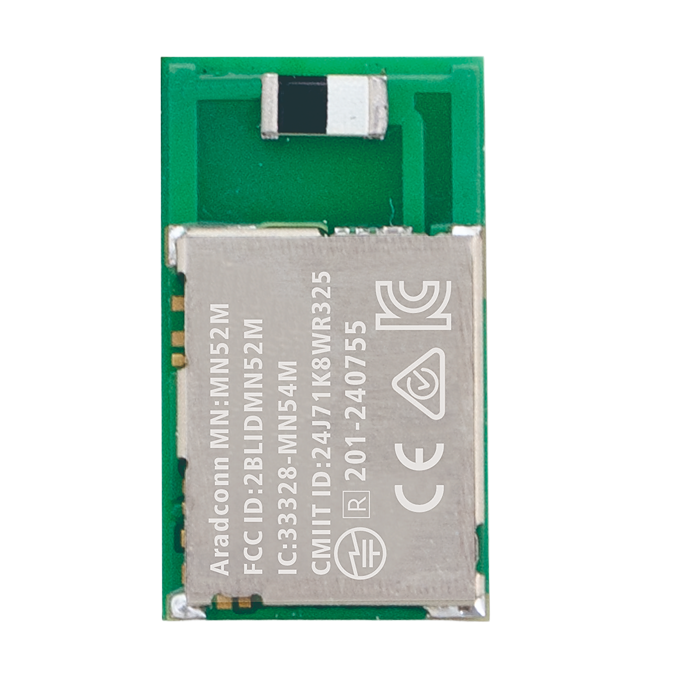Advantages of Using Bluetooth Modules for New Product Development
In today's rapidly evolving technological landscape, the surge in electromagnetic spectrum allocation for advanced communications has paved the way for a plethora of innovative wireless electronic and digital devices. This shift has prompted manufacturers to increasingly favor wireless communication interfaces over traditional wired connections, offering enhanced user mobility without sacrificing transmission speed or accuracy. However, navigating the intricate process of securing global regulatory approval for products with integrated wireless modules remains a significant challenge.
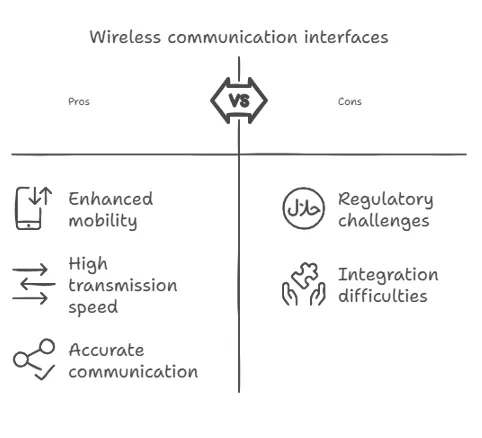
Before introducing new products with wireless transmission features to any new market, manufacturers must secure certification from the wireless (Bluetooth) regulatory authority. This certification ensures that those products meet the required reliability standards. These certifications function like a passport for the product, enabling it to legally enter the market and be imported or exported to designated countries. There are two methods for the certification and regulatory process of wireless communication devices: modular approval and non-modular approval.
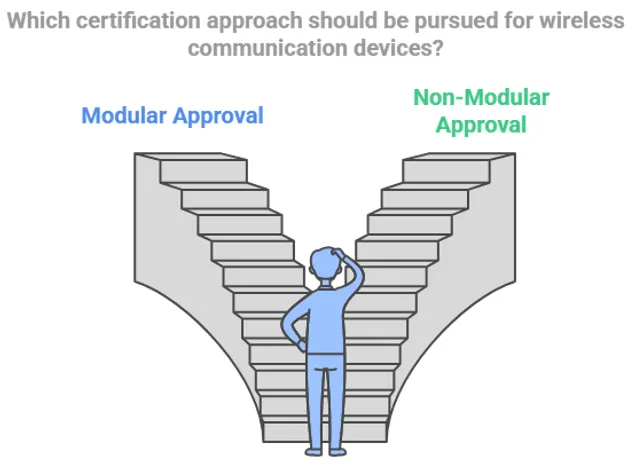
Modular Approval
Modular approval refers to the certification of wireless modules (such as Wi-Fi or Bluetooth modules) during their design and manufacturing stages. This means that the module itself is certified and can be integrated into final products without requiring the entire product to undergo certification again. The advantages of this approach include:
l Simplified Certification Process: Since the module is already certified, manufacturers only need to ensure that the module's use in the final product complies with relevant regulations, avoiding comprehensive certification tests.
l Reduced Time to Market: Modular approval significantly shortens the time to market, as manufacturers do not have to wait for the entire product to be certified.
l Cost Savings: It reduces the costs associated with repeated testing and certification, which is particularly beneficial for small businesses and startups. (Please refer to the Certification Cost Comparison table below)
However, modular approval has its limitations. Manufacturers must ensure that the module's use in the final product does not alter its wireless performance; otherwise, re-certification may be required.
Non-Modular Approval
Non-modular approval requires the entire product to be certified by regulatory bodies, not just the wireless module. The benefits of this approach include:
l Comprehensive Testing: The entire product undergoes thorough testing to ensure that all components work together without causing interference or other issues.
l Flexibility: Manufacturers have the freedom to design and integrate wireless modules without being constrained by the conditions of pre-certified modules.
l Compliance Assurance: Ensures that the entire product complies with regulations in various markets, avoiding compliance issues due to improper module usage.
However, non-modular approval has its drawbacks. The certification process is usually more complex and time-consuming, potentially delaying the product's market entry. Additionally, the comprehensive testing and certification costs are higher, posing a challenge for companies with limited resources.
Some countries follow and accept modular approval, such as the FCC (USA), IC (Canada), Telec (Japan), KC (South Korea), NCC (Taiwan), and SRRC (China). Besides module approval, Arad Connectivity product also complies with the certification that follows non-modular approval, including CE (Europe), RCM (Australia and New Zealand), and others.
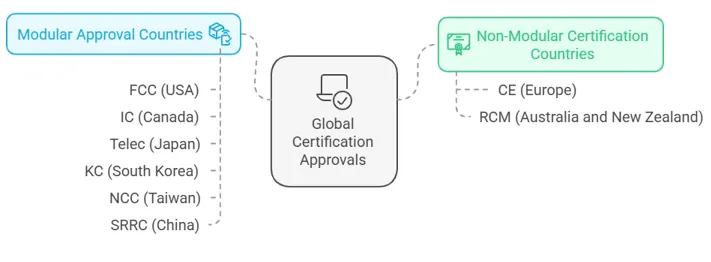
Bluetooth modules of Arad connectivity built with Nordic Semiconductor SoC can effectively increase the transmission range of Bluetooth signals due to our strong wireless signal development capabilities. The minimum transmission distance in an open field can reach 300 meters.
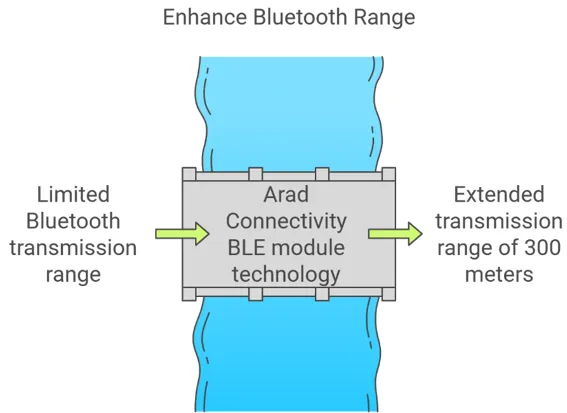
For further information, please refer to the product specifications on the official website of Arad Connectivity.
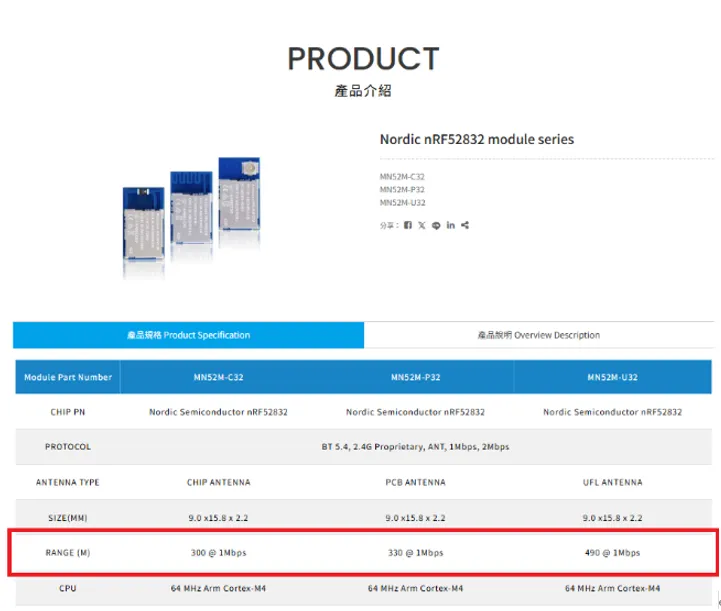
Certification Cost Comparison:
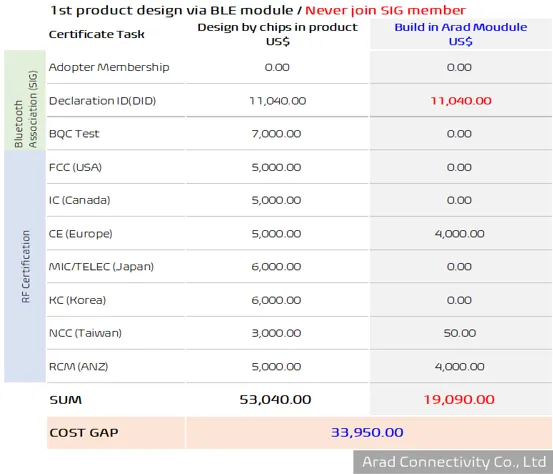
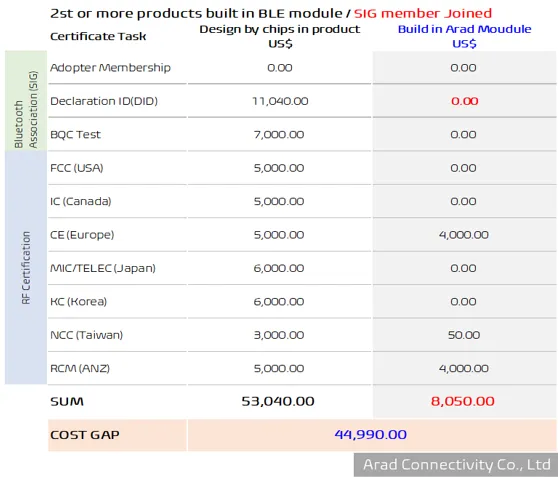
Modular Approval:
l FCC (USA) / Federal Communications Commission
l IC (Canada) / Industry Canada
l Telec (Japan) / Japan Telecom EngineeringCenter
l KC (South Korea) / Korea Certification
l NCC (Taiwan) / National Communications Commission
l SRRC (China) / State Radio Regulation of China
Non-Modular Approval:
l CE (Europe) / CE Marking
l RCM (Australia and New Zealand) / The Regulatory Compliance Mark (RCM)
📢 Get Ready for Our Latest Episode of BLE Tech Pulse Decoded on Aradtube!
Subscribe to our channel and hit that notification bell so you don't miss our newest video releases.
🔗 YouTube: https://www.youtube.com/@Aradconn
🔗 Check out what we have been talking about this on Aradtube: https://www.youtube.com/watch?v=O_DOFYoAVYE&t=74s
Contact us, please email Arad-Connectivity@aradconn.com
Edited by Intl. Commercial Development Manager: Mr. Tim Chien


